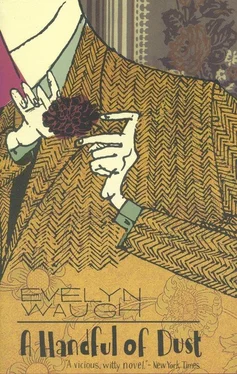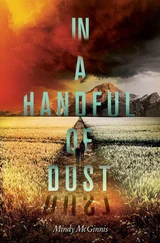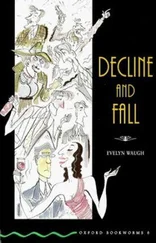Evelyn Waugh - A Handful Of Dust
Здесь есть возможность читать онлайн «Evelyn Waugh - A Handful Of Dust» весь текст электронной книги совершенно бесплатно (целиком полную версию без сокращений). В некоторых случаях можно слушать аудио, скачать через торрент в формате fb2 и присутствует краткое содержание. Жанр: Классическая проза, на английском языке. Описание произведения, (предисловие) а так же отзывы посетителей доступны на портале библиотеки ЛибКат.
- Название:A Handful Of Dust
- Автор:
- Жанр:
- Год:неизвестен
- ISBN:нет данных
- Рейтинг книги:3 / 5. Голосов: 1
-
Избранное:Добавить в избранное
- Отзывы:
-
Ваша оценка:
- 60
- 1
- 2
- 3
- 4
- 5
A Handful Of Dust: краткое содержание, описание и аннотация
Предлагаем к чтению аннотацию, описание, краткое содержание или предисловие (зависит от того, что написал сам автор книги «A Handful Of Dust»). Если вы не нашли необходимую информацию о книге — напишите в комментариях, мы постараемся отыскать её.
It tells of Brenda, Tony and their friends — a wonderfully congenial group who live by a unique set of social standards. According to their rules, any sin is acceptable provided it is carried off in good taste.
A Handful Of Dust — читать онлайн бесплатно полную книгу (весь текст) целиком
Ниже представлен текст книги, разбитый по страницам. Система сохранения места последней прочитанной страницы, позволяет с удобством читать онлайн бесплатно книгу «A Handful Of Dust», без необходимости каждый раз заново искать на чём Вы остановились. Поставьте закладку, и сможете в любой момент перейти на страницу, на которой закончили чтение.
Интервал:
Закладка:
“Now listen, Rosa. You are sensible woman. You lived two years with black gentleman, Mr. Forbes. You like cigarettes — ”
“Yes, give me cigarettes.”
“You come with men in boats, I give you plenty, plenty cigarettes.”
Rosa looked stolidly ahead of her and said nothing.
“Listen. You will have your man and seven others to protect you. How can we talk with men without you?”
“Men no go,” said Rosa.
“Of course the men will go. The only question is, will you come too?”
“Macushi peoples no go with Pie-wie peoples,” said Rosa.
“Oh God,” said Dr. Messinger Wearily. “All right we'll talk about it in the morning.”
“You give me cigarette …”
“It's going to be awkward if that woman doesn't come.”
“It's going to be much more awkward if none of them come,” said Tony.
Next day the boats were ready. By noon they were launched and tied in to the bank. The Indians went silently about the business of preparing their dinner. Tony and Dr. Messinger ate tongue, boiled rice and some tinned peaches.
“We're all right for stores,” said Dr. Messinger. “There's enough for three weeks at the shortest and we are bound to come across the Pie-wies in a day or two. We will start tomorrow.”
The Indians' wages, in rifles, fish-hooks and rolls of cotton, had been left behind for them at their village. There were still half a dozen boxes of `trade' for use during the later stages of the journey. A leg of bushpig was worth a handful of shot or twenty gun caps in that currency; a fat game bird cost a necklace.
When dinner was over, at about one o'clock, Dr. Messinger called Rosa over to them. “We start tomorrow,” he said.
“Yes, just now.”
“Tell the men what I told you last night. Eight men to come in boats, others wait here. You come in boats. All these stores stay here. All these stores go in boats. You tell men that.”
Rosa said nothing.
“Understand?”
“No peoples go in boats,” she said. “All peoples go this way,” and she extended her arm towards the trail that they had lately followed. “Tomorrow or next day all people go back to village.”
There was a long pause; at last Dr. Messinger said, “You tell the men to come here … It's no use threatening them,” he remarked to Tony when Rosa had waddled back to the fireside. “They are a queer, timid lot. If you threaten them they take fright and disappear leaving you stranded. Don't worry, I shall be able to persuade them.”
They could see Rosa talking at the fireside but none of the group moved. Presently, having delivered her message, she was silent and squatted down among them with the head of one of the women between her knees. She had been searching it for lice when Dr. Messinger's summons had interrupted her.
“We'd better go across and talk to them.”
Some of the Indians were in hammocks. The others were squatting on their heels; they had scraped earth over the fire and extinguished it. They gazed at Tony and Dr. Messinger with slit, pig eyes. Only Rosa seemed incurious; her head was averted; all her attention went to her busy fingers as she picked and crunched the lice from her friend's hair.
“What's the matter?” asked Dr. Messinger. “I told you to bring the men here.”
Rosa said nothing.
“So Macushi people are cowards. They are afraid of Pie-wie people.”
“It's the cassava field,” said Rosa. “We must go back to dig the cassava. Otherwise it will be bad.”
“Listen. I want the men for one, two weeks. No more. After that, all finish. They can go home.”
“It is the time to dig the cassava. Macushi people dig cassava before the big rains. All people go home just now.”
“It's pure blackmail,” said Dr. Messinger. “Let's get out some trade goods.”
He and Tony together prised open one of the cases and began to spread out the contents on a blanket. They had chosen these things together at a cheap store in Oxford Street. The Indians watched the display in unbroken silence. There were bottles of scent and pills, bright celluloid combs set with glass jewels, mirrors, pocket knives with embossed aluminum handles, ribbons and necklaces and barter of more solid worth in the farm of axe-heads, brass cartridge cases and flat, red flasks of gunpowder.
“You give me this,” said Rosa picking out a pale blue rosette, that had been made as a boat-race favour. “Give me this,” she repeated, rubbing some drops of scent into the palm of her hands and inhaling deeply.
“Each man can choose three things from this box if he comes in the boats.”
But Rosa replied monotonously, “Macushi people dig cassava field just now.”
“It's no good,” said Dr. Messinger after half an hour's fruitless negotiation. “We shall have to try with the mice. I wanted to keep them till we reached the Pie-wies. It's a pity. But they'll fall for the mice, you see. I know the Indian mind.”
These mice were comparatively expensive articles; they had cost three and sixpence each, and Tony remembered vividly the embarrassment with which he had witnessed their demonstration on the floor of the toy department.
They were of German manufacture; the size of large rats but conspicuously painted in spots of green and white; they had large glass eyes, stiff whiskers and green and white ringed tails; they ran on hidden wheels, and inside them were little bells that jingled as they moved. Dr. Messinger took one out of their box, unwrapped the tissue paper and held it up to general scrutiny. There was no doubt that he had captured his audience's interest. Then he wound it up. The Indians stirred apprehensively at the sound.
The ground where they were camping was hard mud, inundated at flood time. Dr. Messinger put the toy down at his feet and set it going; tinkling merrily it ran towards the group of Indians. For a moment Tony was afraid that it would turn over, or become stuck against a root but the mechanism was unimpaired and by good chance there was a clear course. The effect exceeded anything that he had expected. There was a loud intake of breath, a series of horrified, small grunts, a high wail of terror from the women, and a sudden stampede; a faint patter of bare brown feet among the fallen leaves, bare limbs, quiet as bats, pushed through the undergrowth, ragged cotton gowns caught and tore in the thorn bushes. Before the toy had run down, before it had jingled its way to the place where the nearest Indian had been squatting, the camp was empty.
“Well I'm damned,” said Dr. Messinger, “that's better than I expected.”
“More than you expected anyway.”
“Oh it's all right. They'll come back. I know them.” But by sundown there was still no sign. Throughout the hot afternoon Tony and Dr. Messinger, shrouded from cabouri fly, sprawled in their hammocks. The empty canoes lay in the river; the mechanical mouse had been put away. At sundown Dr. Messinger said, “We'd better make a fire. They'll come back when it is dark.”
They brushed the earth away from the old embers, brought new wood and made a fire; they lit the storm lantern.
“We'd better get some supper,” said Tony.
They boiled water and made some cocoa, opened a tin of salmon and finished the peaches that were left over from midday. They lit their pipes and drew the sheaths of mosquito netting across their hammocks. Most of this time they were silent. Presently they decided to go to sleep.
“We shall find them all here in the morning,” said Dr. Messinger. “They're an odd bunch.”
All round them the voices of the bush whistled and croaked, changing with the hours as the night wore on to morning.
Dawn broke in London, clear and sweet, dove-grey and honey, with promise of good weather; the lamps in the streets paled and disappeared; the empty streets ran with water, and the rising sun caught it as it bubbled round the hydrants; the men in overalls swung the nozzles of their hoses from side to side and the water jetted and cascaded in a sparkle of light.
Читать дальшеИнтервал:
Закладка:
Похожие книги на «A Handful Of Dust»
Представляем Вашему вниманию похожие книги на «A Handful Of Dust» списком для выбора. Мы отобрали схожую по названию и смыслу литературу в надежде предоставить читателям больше вариантов отыскать новые, интересные, ещё непрочитанные произведения.
Обсуждение, отзывы о книге «A Handful Of Dust» и просто собственные мнения читателей. Оставьте ваши комментарии, напишите, что Вы думаете о произведении, его смысле или главных героях. Укажите что конкретно понравилось, а что нет, и почему Вы так считаете.












